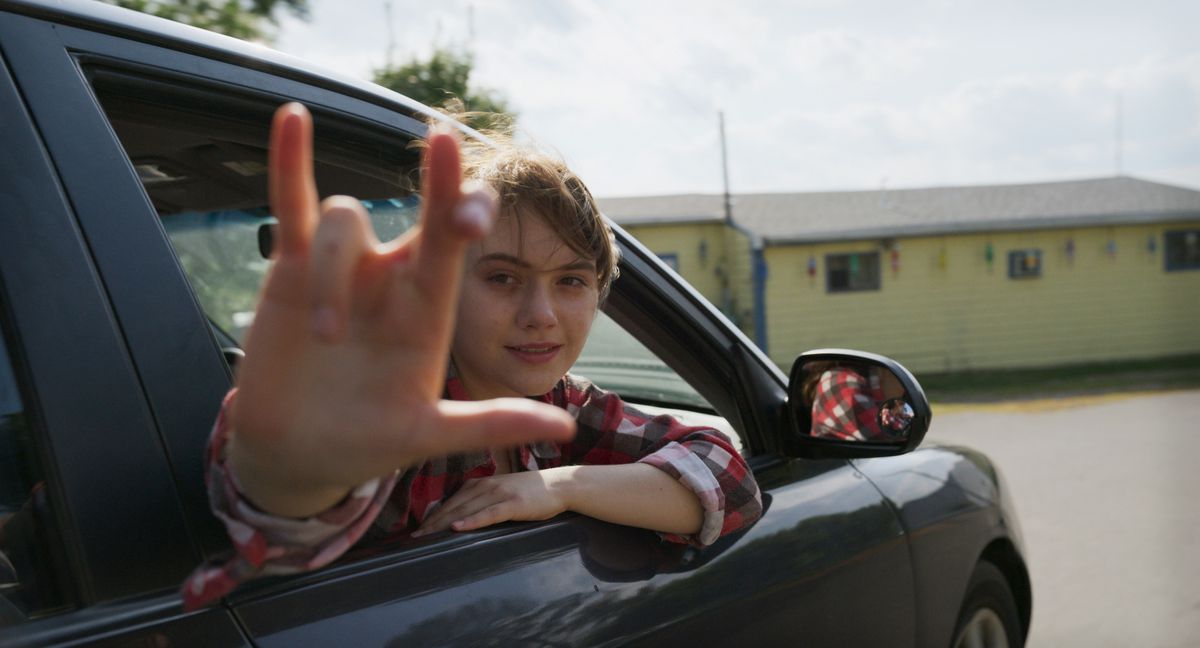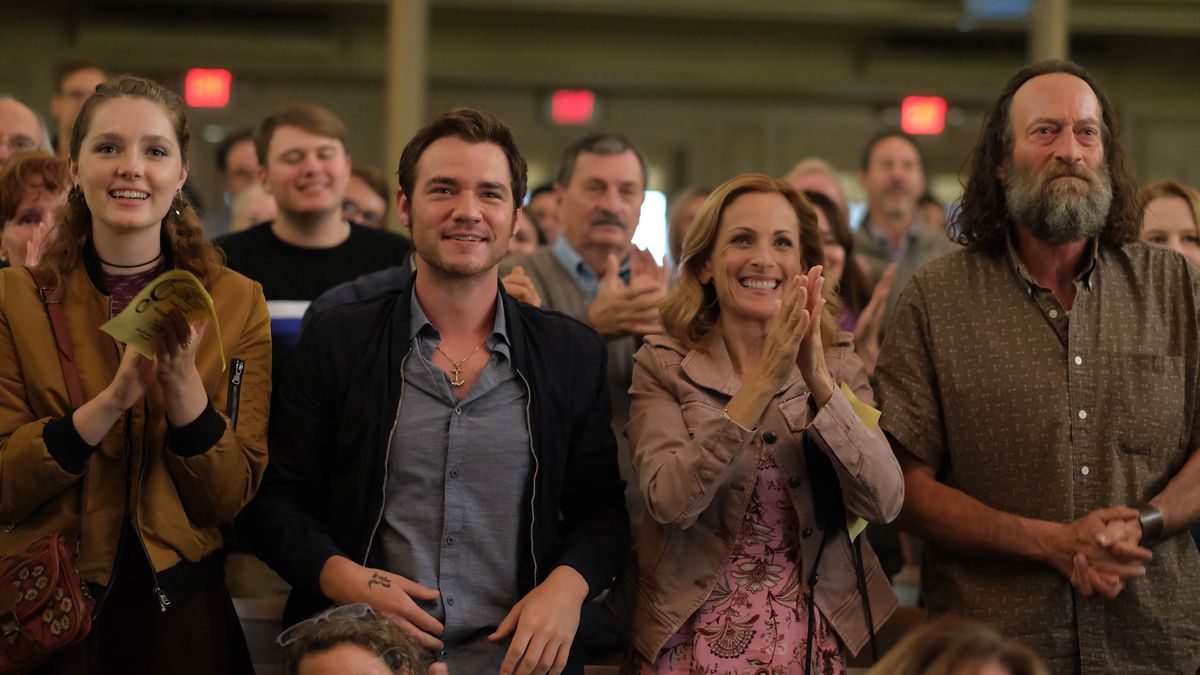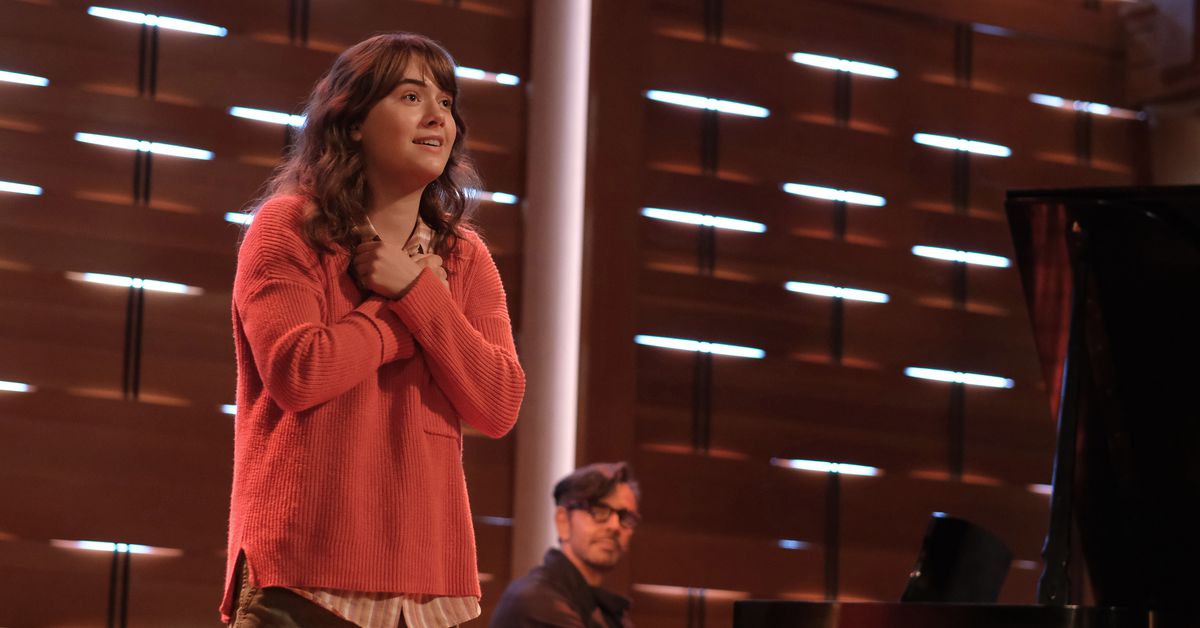[Ed. note: This review was first published in conjunction with CODA’s release at the 2020 Sundance Film Festival. It has been updated for the film’s theatrical release.]
Logline: As her senior year comes to an end, Ruby (Emilia Jones), the only hearing person in her Deaf family, is torn between studying music at college and remaining at home to help — and maybe save — the family fishing business.
Longerline: As a CODA, a Child of Deaf Adults, Ruby juggles multiple roles at the young age of 18. She’s a daughter, a student, a musician, a fisherman, and a translator. In the mornings, she lends her father, Frank (Troy Kotsur), and brother, Leo (Daniel Durant), an ear and an extra pair of hands as they trawl for fish off the coast of Gloucester, Massachusetts. She’s an animated, no-bullshit character while gabbing around the dinner table with her mom, Jackie (Marlee Matlin), or negotiating a fish sale, but at school, she can’t find her voice. After catching the eye of the firebrand music teacher (Eugenio Derbez) during a show-choir audition, Ruby suddenly sees a path for her future: vocal training, the Berklee College of Music, and a life beyond her family. It’s reasonably terrifying.
In this microcosmic moment, everything Ruby knows begins to change. A crackdown on fishing boats puts her father and brother’s deafness under systematic scrutiny and threatens the local fishing industry at large. Her musical pursuits raise the question of what her family will do without her; everyone is perfectly functional in navigating society without vocal speech, but juuuust dependent enough on Ruby as a business liaison that no one can imagine her leaving home. The growing intensity of her Berklee audition rehearsals and a blossoming relationship with her fellow choirmate, Miles (Ferdia Walsh-Peele), pressurize the already intensely intimate scenario.
What’s CODA trying to do? Writer-director Siân Heder (Orange Is the New Black) previously made the 2016 Netflix premiere Tallulah, which followed a homeless teenager who inadvertently kidnaps a baby that she believes needs rescuing from an irresponsible mother. In CODA, she again slices off a piece of life and pops it in a pressure cooker. Replacing the ticking clock with a warmer tone, the family drama aims to both portray the challenges of growing up culturally Deaf, and look beyond disabilities to recognize that life’s hardships, whether in a world full of sound or not, are universal.
The quote that says it all: “I can’t always be that person.”

Photo: Apple TV Plus
Does it get there? Authentic, sensitive, and playful, CODA remains human even as it tugs at the heartstrings. Heder leaves no anthropological distance between her camera and the subjects, ensuring that the movie never “others” the Deaf characters, while still making sense of how much we rely on hearing for simple tasks. On the same note, there’s a fearlessness to prolonged dialogue scenes playing out in ASL. As they talk through their issues, Frank, Jackie, Leo, and Ruby swing from low to high emotions, and the physicality of the performances are absorbing. The UK-born Jones apparently learned to sign, sing, and put on an American accent for the role, and you’d never know it — she holds the movie together in an astonishing breakout performance.
Circumstance puts extra, often funny-in-retrospect hurdles in front of Ruby and her family. When her dad comes down with a jock itch, his teenage daughter melts in a puddle of awkward as she gestures to convey an inflamed genital rash to the doctor, then translates a prescriptive recommendation of abstinence to her mother. On the docks, Ruby and Leo butt heads over the price of their latest fish haul — she knows from what she can hear that he’s getting scammed, but her older sibling is way too proud to let her play hero.
And during a flirtatious rehearsal for their upcoming duet, Ruby and Miles wind up overhearing Jackie and Frank’s… lively… bedroom activity. These are the trials and tribulations of teen life, plus a twist of fate. (And if there’s one bit that doesn’t quite work, it’s Derbez’s over-the-top music teacher, whose sitcomy tone doesn’t quite match the lived-in feeling of the family comedy.)
Heder finds her way into tension and tougher questions. The family’s fear of the unknown is compounded by the possibilities on the horizon: Ruby has a fabulous voice, a skill her parents will never be able to comprehend as a viable future for their daughter. The anxiety arrives just as Frank’s own career path is thrown out of whack; he’s been fishing all of his life, but the extortion of fisherman by dock bigwigs turns his life into a mini Elia Kazan drama. It isn’t as grim as On the Waterfront, but Frank, Leo, Jackie, and eventually Ruby all wind up in a fight to take hold of their business and livelihoods.
There’s a lot on the line, and Heder strings it all together in a mainstream package that recalls everything from Ordinary People to Save the Last Dance and To All the Boys I’ve Loved Before. And while the drama is immediate and timely like those films, it also feels like it has a past and present. This is to say: Yes, I would watch five seasons of the Parenthood version of CODA.

Photo: Apple TV Plus
What does that get us? The movie camera is uniquely equipped to get in close and capture a sign-language spat, and the results in the hands of veterans like Kotsur and Matlin are spellbinding. Writers rarely gift two Deaf actors with the chance to go at it. Heder gives them painful moments behind closed doors, tender scenes with Ruby, and bits where they’re just goofy parents. Durant, best known for playing a Deaf character in a reimagined revival of Spring Awakening, is also fully alive and dimensional as Leo, a tough-but-sweet young man who’s looking for his own career path.
CODA offers a simple explanation for the importance of representation on screen: a century of movies born from homogenous perspectives has left so many stories untold, and so many experiences uncharted. There’s a simple thrill in seeing familiar dramas play out in the hands of actors who’ve often been relegated to side roles. Matlin is a hysterical, vibrant movie star-type who always plays “the Deaf character,” but here, she’s the mother, the wife, and the entrepreneur. She has so much to give the screen, and Heder taps it all.
The film may be a little sweet for some tastes (yes, I cried) but CODA is also refined. In a dark moment, I was thankful for the film’s celebration of family, friends, and life.
The most meme-able moment: Get ready for an extended sequence where Ruby’s new guy-pal Miles learns the ASL translation of “masturbating into a condom.”
When can we see it? CODA launches for streaming on Apple TV Plus on August 13.
Polygon – All
Source link
Related Post:
- Deviation Games: “PlayStation has a culture where it’s fearless to create”
- Bobby Kotick finally responds to Activision Blizzard employees: our initial response was ‘tone deaf’
- Activision Blizzard CEO Bobby Kotick Apologizes For ‘Tone Deaf’ Statement, Read Full Letter Here
- New Life Is Strange: True Colors Gameplay Is 13 Minutes Of Flirting And Choices
- No Man’s Sky fan modding Sean Murray’s head into the game as a form of playful protest
- Official PlayStation Podcast Episode 399: Playful Days – PlayStation.Blog
- King’s Bounty 2 Choices And Consequences Guide
- Biomutant Choices And Consequences Guide
- 11 Design Choices That Need to Change for PS5 and Xbox Series X Games
- Chernobylite Heist final mission guide — Choices and companions
